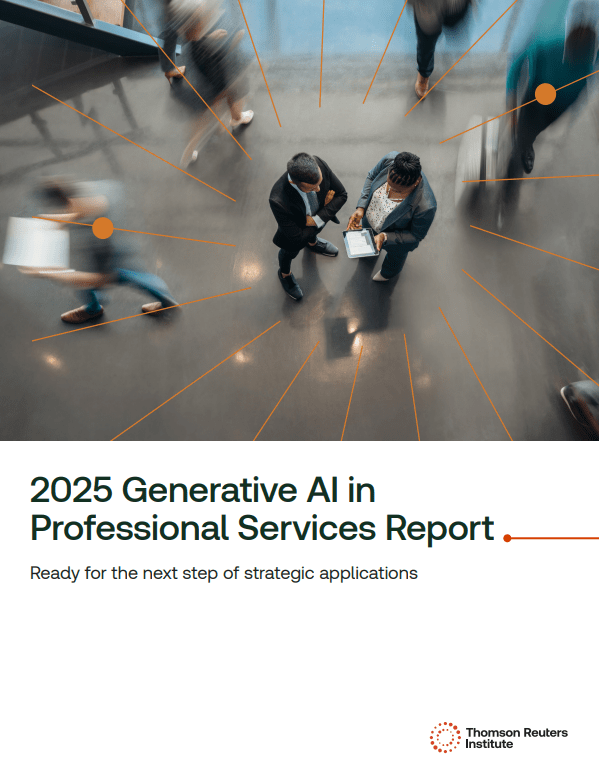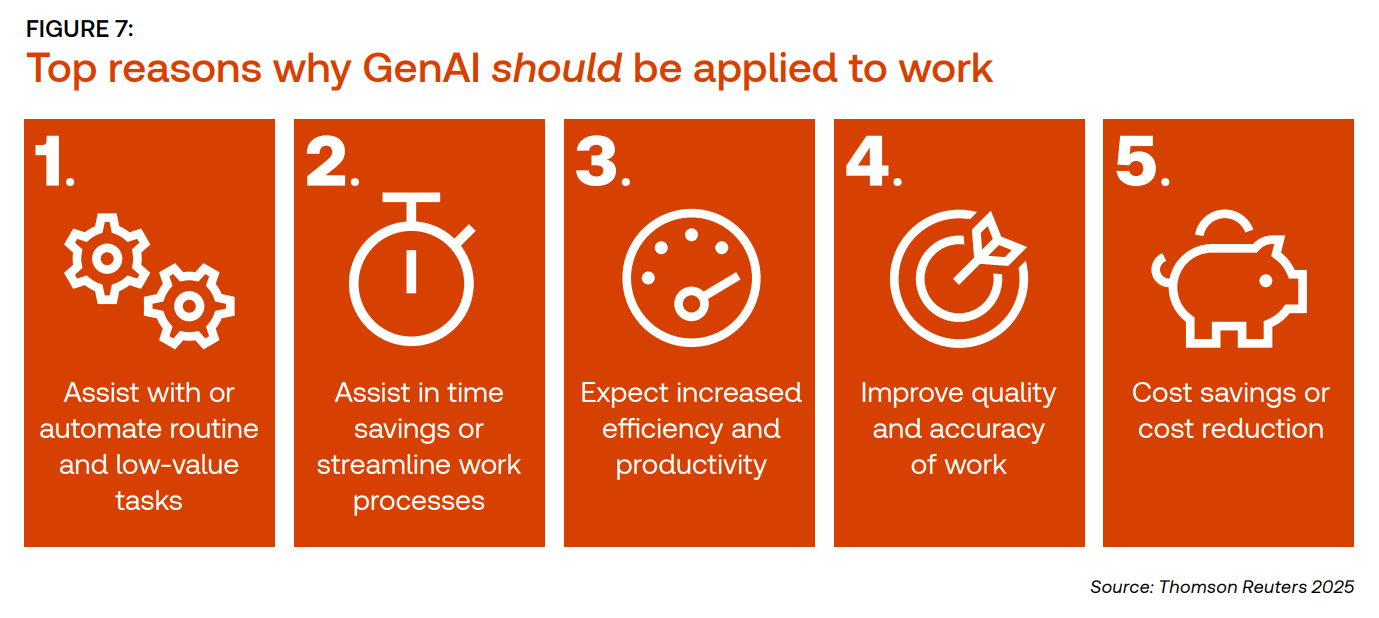The Thomson Reuters Institute has released its latest report on generative AI (GenAI), titled 2025 Generative AI in Professional Services. This comprehensive study explores the attitudes, perceptions, and usage of GenAI among professionals in the legal, tax & accounting, risk & fraud, and government sectors. Conducted in early 2025, the survey gathered valuable insights from more than 1,700 respondents across the United States, the United Kingdom, and Canada, primarily featuring partners, managers, directors, general counsel, assistant general counsel, attorneys, and judges.
Here we’ll highlight the 2025 report’s most important (and, in some cases, surprising) findings and insights pertaining to professionals in law firms, government legal departments, and corporate law practices.
Jump to highlights ↓
Key findings from the new report
Perceptions of GenAI among legal professionals
Usage of GenAI by legal professionals
Impact of GenAI on client relationships

2025 Generative AI in Professional Services Report
Explore all the latest comprehensive insights into how GenAI is shaping professional services.
Access full report ↗
Key findings from the new report
The 2025 Generative AI in Professional Services report offers a deep dive into the transformative impact of GenAI on legal services.
The report has found that legal professionals are increasingly adopting GenAI tools to enhance productivity, streamline workflows, and improve client services while believing it’ll be central to their organization’s workflow within the next five years. However, the report also emphasizes the need for strategic integration of GenAI into legal practices, including establishing policies, training, deeper client discussions of GenAI usage, and measuring its impact on business outcomes to fully realize its benefits.
Thomson Reuters Institute
Perceptions of GenAI among legal professionals
Legal professionals see GenAI as potentially transformative for their industry. Legal professionals surveyed in the report are increasingly seeing the benefits of GenAI, with 59% of law firms and 57% of corporate legal departments believing it should be applied to their work. The top reason for this optimism is the potential to save time and improve productivity, in large part because well-designed GenAI tools can streamline workflow processes. Among other top reasons for optimism cited in the report, professionals believe that GenAI can provide new opportunities for growth and innovation in their practices.

One of the attributes of a rigorously crafted, professional-grade GenAI tool is its capability to continuously “learn” and improve as it works with more and more data. Still, users need to be vigilant, monitoring the results that the tool delivers and scrutinizing those results for accuracy and bias.
Despite these benefits, many legal professionals still have reservations about GenAI. These concerns tend to center on accuracy and misinformation. Some professionals have concerns about AI-generated legal documents with false evidence that might mislead judges and juries. Many report respondents see the unauthorized practice of law as one particularly significant threat. They worry that while GenAI technologies may lack the “expertise” to provide reliable, impartial legal advice; however, they may still be deployed with ethical frameworks.
While concerns persist, the overall sentiment among professionals continues to shift towards seeing GenAI as a tool to augment rather than replace human work. Most of the professionals surveyed in the report believe that the benefits of GenAI outweigh the risks, with 55% of all respondents saying they were hopeful or excited about the future of GenAI (which is up by 11 percentage points compared to 2024).
Usage of GenAI by legal professionals
Not only do most of the legal professionals surveyed in the report believe that they can use GenAI tools in their work—26% say that they’re already using GenAI, compared to 14% of respondents in the 2024 report. According to 2025 report data, the legal industry is demonstrating the strongest GenAI adoption rates among all professionals—28% for law firms and 23% for corporate legal departments. Again, the main reason for this acceptance is the potential for increased productivity and to save time.
GenAI can automate many repetitive, time-consuming tasks through six primary uses cases for legal professionals currently working with the technology. This allows them to spend more of their valuable time on strategic and intellectually engaging work that provides added value to their clients or to their company. A professional-grade GenAI solution could even amplify skills and work for paralegals and legal assistants.
Top six use cases for legal professionals
- Document review – 74%
- Legal research – 73%
- Document summarization – 72%
- Brief or memo drafting – 59%
- Contract drafting – 51%
- Correspondence drafting – 50%
Another intriguing point about usage: Most of the current users (72%) identified in the report engage with GenAI at least weekly, with over 40% using it once or even multiple times each day. Rarely do respondents use it just once or twice a month. This suggests that professionals are following an all-or-nothing approach. In other words, if you adopt GenAI tools, you will use it more often than not.
Impact of GenAI on client relationships
While GenAI has impacted legal professionals’ workflows, the impact on organizations needs more discussion to be further realized. The report clearly demonstrates that clients are strongly interested in knowing whether the legal practices they work with have incorporated GenAI into their operations. In fact, clients are increasingly demanding it. According to the report’s data, 59% of corporate legal clients and 44% of government legal clients want their outside firms to use GenAI. What’s more interesting, 71% of law firm clients don’t know whether their firms use GenAI tools in their work. This suggests that there needs to be a larger discussion around communication between clients and firms concerning this technology’s usage.
This is crucial, because legal professionals need to engage in conversations with clients about GenAI and its impact on value and rates. To be able to conduct these important discussions, legal organizations need to clearly understand and then communicate the benefits that GenAI can deliver to their clients. But despite the growing adoption of GenAI tools, there’s a significant strategic gap. Only 20% of legal professionals surveyed in the report are measuring the technology’s return-on-investment (ROI). Not evaluating that ROI—using metrics such as internal cost savings and client satisfaction—could hinder a legal organization’s understanding of GenAI’s value.
One corporate attorney noted: “It’s the next technology leap for practitioners, with potential to improve productivity and space for creative, strategic thinking. Yet it requires tangible benefits including, ideally, law firms considering how to offer more competitive fees, taking into account the use of technology (rather than people) in aspects of practice.”
Thomson Reuters Institute
Clarity about that value can help legal professionals better grasp how this technology may cause billing rates to change. As legal GenAI becomes more sophisticated and capable of handling more complex tasks, law firms may be able to adopt alternative fee arrangements instead of the billable hour model. On the other hand, of all legal firms surveyed, 53% believe rates will stay the same while 20% believe rates will increase somewhat or significantly. This implies that legal professionals are grappling with a sense of GenAI’s value for their practices and for their clients.
The future of legal work
GenAI has been in the industry for more than 2 years when ChatGPT went public, and it’s only going to continue to expand. Legal professionals have become aware of AI’s redefining impact to make them more productive and to save them time. 95% of all industry professionals surveyed in the report expect GenAI to become a central part of their organization’s daily workflow within the next five years.
“The next 24 months will be extremely telling on the impact of GenAI on the legal industry and professional work more broadly,” said one Australian law firm attorney. “As products move out of development [and in]to production, we will be able to see the actual effects of this technology across various sectors.”
Thomson Reuters Institute
Despite this enthusiasm, the report suggests that in general, professionals aren’t preparing themselves for the GenAI future even though there’s many reasons why they should—52% say that their organization doesn’t have GenAI usage policies, and 64% have received no specific GenAI training. However, the numbers have been improving for training. In the 2025 report, 31% of those surveyed say that training was available to them, compared to 19% in 2024. Law firms (40%) and corporate legal practitioners (41%) enjoy the highest levels of accessibility to this necessary learning. Furthermore, 21% of law firm respondents consider GenAI skills a “nice-to-have” qualification when evaluating potential hires.
With the concept of agentic AI in legal on the rise, legal professionals need to further prepare for the future of AI. Agentic AI uses GenAI to create autonomous agents with specific goals, allowing them to work independently with minimal human oversight and check their own work before giving it back to the legal professional for final review.
Preparing for the future
The future of AI for legal lies not in replacing attorney judgment but in augmenting it with tools that can quickly access, analyze, and synthesize the vast corpus of legal authority that underlies our legal system. If legal professionals and organizations are committed to successfully incorporating AI and its benefits into their practices, they should be ready to accommodate the changes that it will introduce into that work and find professional-grade GenAI solutions that will enhance their organization. Organizations that put this off are at risk of being quickly left behind in a competitive market. Preparations should include establishing training programs and governance protocols to ensure ethical and effective use of this ever-evolving technology.
When researching for a professional-grade GenAI solution, you need one that understands professional standards and can deliver reliable results at superhuman speed. And most importantly, it needs to be encrypted end-to-end, so your data—and your customers’—remains private and secure. That is professional-grade generative AI.
By grounding AI responses in this authority, professional-grade GenAI tools like CoCounsel help ensure that technology enhances rather than undermines the quality of legal services. Thomson Reuters CoCounsel is the industry-leading GenAI assistant that works alongside you within all your legal products and integrations. CoCounsel goes with you from task to task, from research to analysis to drafting—creating a single, seamless workstream.
Bringing together generative AI, trusted content and expert insights
CoCounsel












